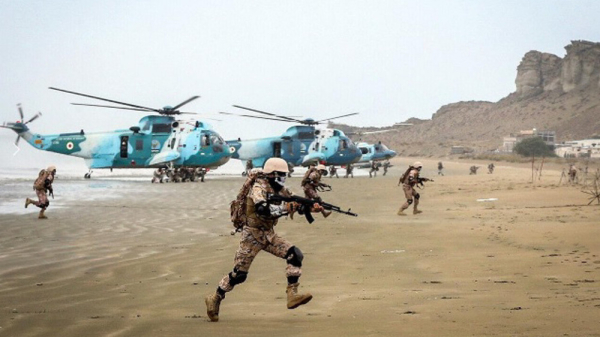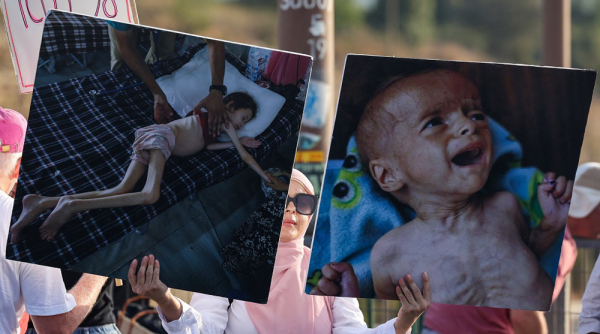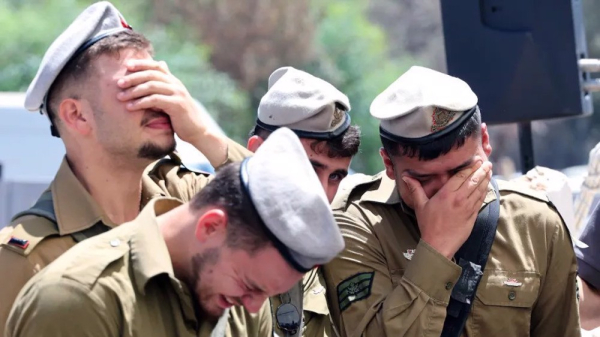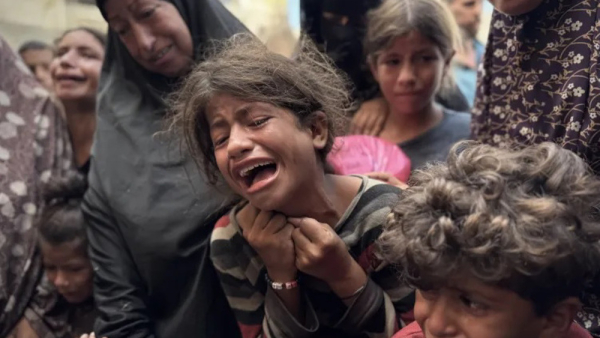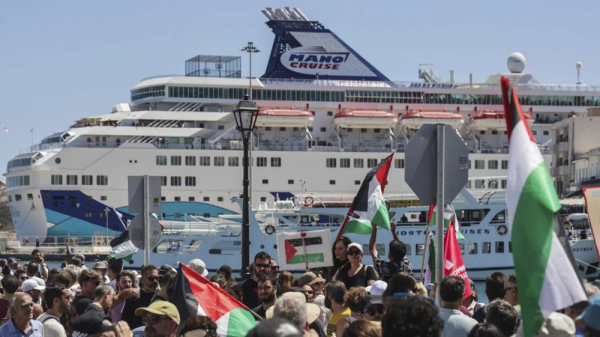zarezadeh
Why Egypt’s failed ‘normalization’ gamble with Israel serves as warning for others
By Robert Inlakesh
As the first Muslim Arab state to normalize relations with Israel, Egypt’s experience offers a lesson for others eager to jump on the US President Donald Trump’s so-called Abraham Accords bandwagon.
A country teetering on the brink now, under the immediate threat of an Israeli military invasion and still attempting to finalize deals with the regime in Tel Aviv even after its normalization treaty was broken.
Egypt serves as a perfect case study for the Arab normalization model. A once independent regional power, exerting cultural, ideological and even military power throughout the Arab world and beyond, Cairo has devolved into a chaotic mess that is not only in economic and social decline, but is also largely beholden to the US, NATO military alliance and its Persian Gulf backers.
The road to Egyptian normalization with Israel began in the aftermath of the defeat in June 1967 war. Israel launched a surprise attack, dubbed “Operation Focus”, which wiped out most of the country’s air force while it was still on the ground.
In only 6 days, Tel Aviv’s offensive had succeeded at occupying East al-Quds, the West Bank, Sinai Peninsula, Golan Heights and Gaza.
Years later, Egypt’s President Gamal Abdul Nasser died of a heart attack. Until that moment, one of the dominant regional ideologies had revolved around his version of Socialist Arab Nationalism, popularly referred to as Nasserism.
However, unlike other ideologies, it was largely centered on a concept of one man and thus the defeat of this Arab nationalist wave came swiftly with the conclusion of the 1967 war.
During this period, the region underwent a major shift. Marxism gained popularity, nationalist movements surged, and Islamic groups slowly began to assert their presence as well.
Equally important was the evolution of US imperialist strategy in the West Asia region.
The US-Israel relationship soared to unprecedented heights, bolstered by intensified Zionist lobbying in Washington. Tel Aviv became Washington’s foremost regional ally in its Cold War battle for dominance, securing billions in aid and weapons.
Meanwhile, the memory of the Arab defeat in 1967 never faded and fueled greater resistance. The Palestine Liberation Organization (PLO) rose in regional and global prominence, taking full leadership of the Palestinian liberation struggle, making Palestinians the main enemy of the US in the region.
In the midst of this, Egypt and Syria conspired to launch an offensive aimed at restoring Arab honour and reclaiming the territories occupied in 1967.
In 1973, what came to be known as the October War unfolded. Despite delivering stunning defeats to Israel and reclaiming occupied territories, the Egyptian forces under President Anwar Sadat halted their offensive. Meanwhile, the US rushed massive supplies to Israel, enabling it to regain the upper hand.
Due to Egypt’s decisions, interpreted by the leadership of Syria under President Hafez al-Assad as a betrayal, the Israelis managed to once again reoccupy the territories they had captured in 1967.
While a key takeaway here was that Israel was far from invincible and could be subjected to defeats, the power of the US proved sufficient to save Tel Aviv.
While Arab regimes used this as a lesson to back off, the most important lesson that was never truly learnt was that hesitancy is the real killer and that refusal to act eventually gives the more advanced enemy the time it needs to plan and move assets into position.
If the surprise attack from both Egypt and Syria had been followed through all the way, they may have succeeded.
Following the October War, Egyptian President Anwar Sadat swiftly decided to pivot Egypt toward the US, pursuing normalization with Israel and effectively abandoning the Palestinian cause.
In 1978, Egypt and Israel signed the Camp David Accords, setting the stage for the 1979 normalization agreement. In return, Egypt firmly aligned with the US-led bloc, receiving vast aid packages and integrating its defense arrangements with the West.
Between 1978 and 2022, the US granted Egypt over $50 billion in military aid and $30 billion in economic assistance. This alignment with the us also came at the expense of the military regime that had, in effect, run Egypt since 1952, implementing liberal economic reforms (enfitah) that eventually culminated in the assassination of President Sadat.
A key figure from Cairo’s military establishment, Hosni Mubarak, then assumed control for over three decades. Under his rule, Egypt pursued a US-backed neoliberal model, even as rampant corruption, state violence, incompetence, and crony capitalism steadily eroded the country.
Continuing to work in Israel’s favour, in 2005, Mubarak inked a 15-year multi-billion-dollar gas deal with Israel, aimed at supplying the occupying regime with 1.7 billion cubic meters of natural gas per year via an undersea pipe from al-Arish to Ashqelon.
Even on this deal, Mubarak worked closely with Eastern Mediterranean Gas (EMG) co-owner and Israeli Mossad asset, Hussein Salem, to sell Egypt’s gas for as little as $1.50 per million British Thermal Units (MBTU), when the international price was around $12.60. The result was that Salem and his Israeli partners reaped the profits while Egypt lost $11 billion in revenue.
Despite the announced “reforms” announced by Egypt in the early 2000s, the Egyptian people continued to suffer under a pro-US leadership that collaborated with Israel on various projects, while the country relied on US aid handouts to function.
The results of this normalization scheme by 2011, when the Egyptian revolution came, were that one in five Egyptians lived below the poverty line, as their rich elites lived in villas.
By 2021, some estimates put the poverty rate in Egypt at 58.50 percent, which was actually better than in the previous years. By 2023, Egypt stood on the brink of economic collapse and prior to October 7, 2023, it looked as if the situation was ready to deteriorate, before the IMF, European Union and UAE began stepping in to help it.
In 2022, another measure taken by Cairo was to begin selling off stakes in state-owned businesses to private corporations. The Persian Gulf states, which financed the rise of General Abdel Fattah el-Sisi to power in a military coup back in 2013, now own huge stakes in many formerly State-owned businesses.
Despite the Western-Arab lifeline, Egypt is only getting worse on the global Economic decline index, scoring a whopping 7.20, which has been rising since 2022.
Back in 2018, although Cairo had previously been exporting gas to Israel, the pipelines were reversed, and a new arrangement was struck for Egypt to purchase gas from Israel.
This ultimately culminated in the August 7, 2025, deal, in which Egypt committed to a \$35 billion gas agreement with the Israeli energy company NewMed.
Now, as Israel commits genocide in Gaza, Egypt is under another potentially existential threat and from the neighbouring entity that it sought to gain economic prosperity through.
Israel already violated the 1979 normalization agreement last year when it decided to invade the Rafah Crossing and Philadelphi Corridor, also murdering Egyptian soldiers and launching airstrikes into the Sinai, to which Cairo refused to respond.
Despite this, Israeli Prime Minister Benjamin Netanyahu recently confirmed his intention to advance the so-called “Greater Israel” project, which includes seizing Egyptian territory.
Last year, a campaign of incitement against Egypt emerged from pro-war think tanks and Israeli politicians, relying on fabricated claims to justify a potential Israeli invasion of the Sinai.
Meanwhile, the Trump administration repeatedly signaled its intent to ‘own Gaza’ and pursue ethnic cleansing, with little regard for Egyptian interests.
Although Egypt is often perceived as one of the region’s largest military powers, this reputation is misleading. Its actual military expenditure is relatively low compared to neighboring states, and soldiers’ salaries are so meager that some have resorted to running lemonade stands to supplement their income.
Compounding these issues, Egypt purchases advanced arms from Western nations without fully understanding how to operate them or integrate different systems effectively. In other words, these acquisitions serve Western weapons manufacturers more than Egypt’s actual defense strategy.
All of this unfolds as social tensions in Egypt continue to simmer, threatening to erupt into mass protests at any moment. A stark warning came last month when 21-year-old Ayman Abdel Wahhab was tortured to death while in police custody, sparking riots against the authorities. The public is also fed up with a constant stream of promised projects that either never materialize or benefit only the wealthy.
As the first Arab state to normalize ties with Israel, Egypt’s trajectory offers a cautionary tale for others contemplating the same path.
Normalization has undermined Egypt’s sovereignty, entrenched submission to external powers, enriched the elite, and pushed the broader population deeper into poverty and despair.
Today, the country teeters on the brink, bearing a stark warning for other Arab countries that are considering a similar course.
Robert Inlakesh is a journalist, writer and political analyst who has lived in and reported from the occupied West Bank.
Press TV’s website
Palestinian basketball player killed by Israel while searching for food in Gaza
Mohammed Shaalan, nicknamed “the Earthquake,” was targeted by Israeli gunfire in Khan Younis, southern Gaza Strip, on Tuesday.
At the time of his murder, Shalaan had been searching for food and medicine for his children, particularly his daughter Maryam, who suffers from severe blood poisoning and kidney failure.
The famous Palestinian player had played hundreds of games for the Palestinian national team and several local clubs.
His participation in Arab and international tournaments cemented his reputation as one of Palestine’s most recognized athletes.
Shalaan's killing is the latest blow to the Palestinian sports community, which has endured further losses in recent days. Two more members were killed within 24 hours of Shaalan's death.
Salem Shaer, 26, equipment manager of Shabab Rafah Club, and Ahmad Jourani, 40, a former Al-Salah Club player, were both shot dead by the Israeli forces while waiting for aid near the Netzarim corridor.
Israel has recently come under international criticism for killing Suleiman al-Obeid, also known as the “Palestinian Pele."
Al-Obeid, 41, was fatally shot by the Israeli forces while waiting for humanitarian aid at a distribution point in southern Gaza.
A father of five, he was regarded as one of Palestine’s greatest footballers, having played 24 official matches for the national team and scoring twice.
The ongoing Israeli bombardments, the collapse of infrastructure, and famine have devastated Gaza’s sports community.
According to Palestinian officials, more than 800 athletes have been killed in Gaza since October 7, 2023, when the Israeli regime began its genocidal war on the besieged strip.
The Palestinian Football Association (PFA) reported that 421 football players were among the 808 athletes killed over the past 22 months.
The PFA said 288 sports facilities have been damaged or destroyed across Gaza and the West Bank since the war began, including gyms, football clubs, and stadiums.
Its own headquarters was among the buildings struck. Of those facilities, 268 were in Gaza, while 20 were in the West Bank.
Since Israel began its genocidal war on Gaza, the regime has murdered nearly 62,122 Palestinians and wounded 156,758, most of them children and women.
Forced starvation has killed 266 Palestinians, including 122 children, Gaza health authorities reported.
Press TV’s website
Iran’s top military command says Armed Forces fully ready to repel threats
Iran’s top military command has underlined the total combat readiness of the country’s Armed Forces in fighting off any potential acts of aggression by enemies against Iranian soil.
“The Armed Forces are in full readiness, closely monitoring any enemy movements, and if they make any miscalculation and attempt to encroach on the sacred soil of our country again, they will face a more crushing response,” the commander of the Khatam al-Anbiya Central Military Headquarters said on Wednesday.
The announcement comes as the Iranian Navy is scheduled to kick off the operational phase of its Eqtedar (Authority) 1404 missile exercise on Thursday.
Navy spokesperson Rear Admiral Abbas Hassani said the two-day missile exercise will take place in the Sea of Oman and the northern Indian Ocean, involving surface and subsurface vessels, aerial units, coast-to-sea missile sites, sea-based missile platforms, and electronic warfare units.
Hassani added that the exercise will also incorporate missile launches, electronic warfare drills, and drone operations based on experience gained during previous exercises and established operational guidelines.
Pointing to the armaments and missile systems, the Navy spokesperson underlined that a wide range of precision cruise missiles with short, medium, and long ranges will be leveraged to target and destroy surface vessels.
Hassani also emphasized that the exercise aims to enhance the force's combat readiness, boost public confidence, improve operational planning, command and control capabilities, and strengthen deterrence based on domestic expertise.
Iran to use new missiles in case of new aggression: Minster
Also on Wednesday, Iran's Defense Minister Brigadier General Aziz Nasirzadeh said the missiles the Armed Forces used against Israel in June’s 12-day war had been domestically produced a few years ago, warning that newly-manufactured missiles with much better capabilities would be used in case of any fresh Israeli onslaught.
“In the 12-day war, we faced a fully supported power. In this war, the Islamic Republic of Iran did not confront only the Zionist regime, as the entire logistical, intelligence, and support capabilities of the United States were present in this war,” Nasirzadeh said.
Stressing that the Iranian Armed Forces had no reliance on foreign resources and used what was made by the country's defense industries, Nasirzadeh said the world witnessed that the missiles launched by Iran hit their targets perfectly and inflicted severe damage on the Israeli regime.
“The missiles used in the 12-day war were manufactured by the Defense Ministry a few years ago. Today, we have manufactured and possess missiles that have much better capabilities than previous missiles, and if the Zionist enemy undertakes another act of adventurism (against Iran), we will definitely use these missiles,” he added.
Nasirzadeh also said the Israeli regime had used the full power of its so-called air defense systems during the 12-day war, including the THAAD, MIM-104 Patriot, Iron Dome, and Arrow systems.
“Despite the use of all these systems, the Zionist regime only prevented about 40 percent of our missiles from hitting in the first days of the war. But in the final days of the war, 90 percent of our missiles were hitting their targets, which made it clear that our experience had increased while the opposing side’s defense capabilities had decreased,” he added.
“If this trend had continued, the Islamic Republic’s Armed Forces would have definitely had the upper hand.”
On June 13, 2025, the Israeli regime launched strikes against Iran, targeting several civilian, military, and nuclear facilities, which led to the assassination of a number of Iranian military commanders and nuclear scientists.
In retaliation, Iran unleashed waves of drones and missiles at the occupied territories under the operational name True Promise III, inflicting significant damage on both settlements and military installations.
On June 22, 2025, the US Air Force and Navy carried out airstrikes against three Iranian nuclear facilities in an attempt to relieve pressure on the Israeli regime.
The following day, June 23, Iranian forces retaliated with over 30 drones and missiles against the US base in Qatar, under the codename Operation Glad Tidings of Victory, damaging multiple parts of the facility.
Finally, on June 24, after suffering heavy losses at the hands of Iran’s Armed Forces, both the Israeli regime and the US were forced to agree to a cessation of hostilities.
Press TV’s website
Situation in Gaza
Sara Awad is an English literature student, writer, and storyteller based in Gaza. Passionate about capturing human experiences and social issues, Sara uses her words to shed light on stories often unheard. Her work explores themes of resilience, identity, and hope amid war.
To those who still care, this may be the last letter I write from Gaza City.
We are expecting Israel to officially issue its “evacuation orders” any time now. My beloved city, Gaza, stands on the brink of a full military occupation by the Israeli army. Their plan is to force us all to leave our homes and move into tents in the southern part of the Strip. We do not know what will happen to those who resist. We may be living our last days in Gaza City.
Since the beginning of the war, we have heard that Israel wants to occupy our city and take it as a settlement area for its people. At first, we didn’t believe it; we thought this kind of news was psychological warfare. After all, we have had “evacuation orders” before and people were able to return, even if it was to the ruins of their homes.
On October 13, shortly after the genocide started, the Israeli army told everyone in northern Gaza, including Gaza City, to move south. The orders were accompanied by relentless bombardment. Hundreds would sometimes die in a day. Hundreds of thousands of people fled south for their lives.
We didn’t. My father refused to leave our home, so we all stayed. We lived in our home for months in unbearable pain and fear. We witnessed the destruction of our neighbourhood with our eyes.
Then the Israeli army cut off the north from the south. Aid could not reach the north. From January to April 2024, my family and I lived the most suffocating days of the war. We were starved; we spent our days searching for anything to ease our hunger. Sometimes, we were forced to eat animal feed.
In January this year, when a ceasefire took effect, people were allowed to go back to the north. It was an emotional moment that reflected just how much we, Palestinians, are attached to our land.
This time, the atmosphere feels different. It feels that the threat of permanent occupation, of permanent loss, is very real.
“In preparation for the transfer of civilians from the war zone to the south … a large number of tents and shelter equipment will be allowed to enter [Gaza]”, Israeli army spokesperson Avichay Adraee posted on Facebook.
People across Gaza read this news with a heavy heart. There are many questions and few answers: Where will we flee? When will this start? Will anyone intervene and stop this catastrophe?
People are overwhelmed – emotionally, mentally, physically, financially; they cannot endure any more suffering.
Since my family and I heard this announcement, we have been looking at each other with confused, fearful eyes.
When I saw images on social media of tents and tarpaulins entering Gaza City, my heart broke into a million pieces. The thought of my future being stuffed into a tent terrified me. My dreams are big; how can I fit them into a small tent?
I told my father I don’t want to live in a tent. Tears were rolling down my cheeks. He looked at me with helplessness in his eyes and said, “We do not have another choice, the tent is becoming our new reality.”
We do not want to leave, but we feel we do not have a choice. We do not think we can endure the relentless bombardment and shelling once again. The Israelis will likely be even more brutal when they invade this time. It will not be punishment this time; it will be total erasure.
Feeling the end of their city is coming, people are spending what they fear may be their last days in it with their families, having their single meal for the day, together. They are walking around their neighbourhoods, taking pictures of themselves with the places tied to their childhood memories, capturing everything that might be erased.
I write these words, sitting in a shared workspace where many students and writers are trying to fight the fear of what is to come by studying and working. They are hanging on to their work routines, hoping for some normalcy amid the terrifying chaos.
People in Gaza love life, even when life means surviving by the bare minimum. Even in the darkest moments, we always find a way to have hope, joy, and happiness.
People in Gaza love life, even when life means surviving by the bare minimum. Even in the darkest moments, we always find a way to have hope, joy, and happiness.
I want to have hope, but I am also terrified – not only of the bombs, of forced displacement, of tents and exile. I am terrified of being cut off from the world, of being silenced.
I feel like what Israel is preparing for us in the south is a concentration camp where we will be cut off from the world, our voices muffled, our existence erased.
I do not know how much longer my words will reach the outside world, so I want to take this opportunity to make an appeal.
Do not forget me, Sara Awad, a Palestinian student, whose biggest dream is to finish her degree in English literature and become a professional journalist.
Death toll of Palestinian journalists in Gaza rises to 239 as another reporter killed in Israeli strike
Local Gaza authorities say the Israeli military has killed another Palestinian journalist in the strip, bringing the death toll to 239 since the occupying Tel Aviv regime launched its all-out onslaught on the blockaded territory in early October 2023.
A medical source stated that at least three Palestinians were killed and several others injured in an Israeli strike on the Sabra neighborhood of Gaza City on Monday.
Local Palestinian outlets reported that journalist Islam al-Koumi was among the victims.
This comes as the remains of a journalist from Gaza were uncovered weeks after an Israeli strike claimed her life.
Marwa Musallam was buried under the rubble after an Israeli airstrike in Gaza City in July. Her cries for help went unanswered amid pleas to pressure Israel to allow rescuers to reach her.
Musallam’s remains were discovered 45 days later.
Meanwhile, the Columbia Journalism Review (CJR) has requested suggestions from reporters, editors, and rights specialists to investigate innovative methods for safeguarding Palestinian journalists in Gaza.
In a recently introduced feature, the CRJ has advocated for a courageous, innovative strategy aimed at protecting reporters on the ground, who are confronted with assassinations and smear campaigns due to the deterioration of legal and institutional safeguards.
The proposals included sanctions against Israeli officials, media strikes, coordinated blackouts, and charges of war crimes at the International Criminal Court.
“Journalists in Western newsrooms could strike. They could refuse to work until some sort of substantive demand for a policy change at these institutions is fulfilled,” Drop Site News’s Sharif Abdel Kouddous said.
“What could this policy change be? Perhaps a disclaimer at the bottom, or within, every article that quotes Israeli authorities that Israel has killed far more journalists in Gaza than anywhere in the world since the Committee to Protect Journalists started keeping records, and therefore the veracity of any statement is dubious.”
As Israel persists in prohibiting foreign journalists from accessing the coastal territory, Palestinian reporters continue to be the exclusive source of firsthand reporting from within the conflict zone.
The Federation of News Agencies of the Organization of Islamic Cooperation (OIC) has expressed its deep concern over the continued assassination of Palestinian journalists by the Israeli forces while carrying out their duties.
The federation emphasized that what is happening in Gaza constitutes a clear violation of international laws and norms, and comes in the context of Israeli violations of freedom of the press and media, and its policy of confiscating the truth, gagging, covering up its daily violations, and preventing them from reaching global public opinion.
The Israeli military has pursued a brutal offensive on Gaza since October 7, 2023, dismissing international appeals for a ceasefire. The war has killed at least 62,004 Palestinians, predominantly women and children.
The unrelenting airstrikes have also ravaged the region and caused significant food shortages.
The International Criminal Court issued arrest warrants last November for Israeli Prime Minister Benjamin Netanyahu and former minister of military affairs Yoav Gallant, citing war crimes and crimes against humanity in Gaza.
Israel also faces a genocide case at the International Court of Justice for its war on the besieged coastal territory.
Press TV’s website
Gaza hunger death toll rises as Israel ‘deliberately’ starves Palestinians
Five more Palestinians, including two children, have died of hunger over the past 24 hours in the Gaza Strip, where a rights group says Israel is enacting a "deliberate policy" of starvation against Palestinians.
In a statement released on Monday, the Gaza Health Ministry said the five new deaths bring to 263 the total number of people who have starved to death in the besieged territory during Israel’s 22-month genocidal war. It added that 112 children are among the fatalities.
Meanwhile, Amnesty International said Israel is “carrying out a deliberate campaign of starvation in the occupied Gaza Strip, systematically destroying the health, well-being and social fabric of Palestinian life.”
In a report citing testimonies of displaced Palestinians and medical staff who treated malnourished children, it noted that hunger is the “intended outcome” of Israeli policies and “part and parcel” of the regime’s ongoing genocide in Gaza.
Erika Guevara Rosas, Senior Director for Research, Advocacy, Policy and Campaigns at Amnesty International, said the testimonies collected in the report are “far more than accounts of suffering, they are a searing indictment of an international system that has granted Israel a license to torment Palestinians with near-total impunity for decades.”
She also underlined the urgent need to halt any Israeli plan to entrench its occupation of Gaza or escalate the offensive there.
She further called on the international community, particularly Israel’s allies, to uphold their moral and legal obligations to bring an end to the Gaza bloodshed.
“States must urgently suspend all arms transfers, adopt targeted sanctions and terminate any engagement with Israeli entities when this contributes to Israel’s genocide against Palestinians in Gaza,” Guevara Rosas said.
Israel unleashed its brutal Gaza onslaught on October 7, 2023, after the Hamas resistance group carried out its historic operation against the occupying entity in retaliation for the regime’s intensified atrocities against the Palestinian people.
The Tel Aviv regime has so far failed to achieve its declared objectives of eliminating Hamas and freeing all captives in Gaza, despite killing 62,004 Palestinians, mostly women and children, and injuring 156,230 others.
A mass starvation is also gripping Gaza due to Israel’s blockade of the territory that prevents the entry of essential supplies.
Press TV’s website
Facing troop shortages, Israel eyes recruitment from US and France
Israel’s military is considering a plan to recruit young Jews from abroad as it grapples with a severe shortage of soldiers amid its ongoing genocidal war on the besieged Gaza Strip.
According to Israel’s Army Radio on Monday, the proposal would target major Jewish communities overseas, particularly in the United States and France, with the aim of enlisting around 700 recruits annually.
The shortage has compounded wider problems for Israel’s armed forces, including equipment deficits and a reserve system strained by months of fighting in Gaza.
Many reservists have also reported psychological issues and exhaustion linked to the genocidal war.
The move comes as the military struggles with a shortfall of 10,000 to 12,000 troops, driven largely by the refusal of ultra-Orthodox Jews, or Haredim, to serve.
For decades, Haredi men who account for about 13 percent of Israel’s population of 10 million have been exempt from Israel’s mandatory military service to pursue full-time religious studies.
However, a 2023 ruling by Israel’s high court ended these broad exemptions, prompting the military to begin enforcing draft orders amid growing troop shortages.
Haredi leaders have accused the Israeli regime of violating their religious beliefs and threatening their way of life.
In July, the Israeli daily Maariv said senior commanders had, for the first time, admitted to the scale of the depletion, estimating a gap of about 7,500 soldiers. Battalion leaders cited crushing workloads, with some signaling plans for early retirement.
The Israeli regime was also reportedly luring around 30,000 asylum seekers from African countries to the army by offering them permanent residency in the occupied territories.
An Israeli military investigation has found a rise in suicides among its soldiers, with the majority of the cases being directly linked to the profound psychological trauma and exposure to extreme conditions experienced during the genocidal war in Gaza.
The findings indicated that most suicides stemmed from prolonged exposure to combat, traumatic battlefield experiences, and the psychological toll of losing comrades.
Despite attempts by the Israeli army to censor reports of suicides and the surrounding circumstances, evidence continues to emerge of a sharp increase in such cases. Media outlets have suggested that the actual number of suicides may be even higher than reported.
The army has reportedly been burying some of these soldiers without military funerals or public announcements, in a desperate effort to conceal the extent of the crisis.
In recent months, a growing manpower shortage has prompted the Israeli army to recall soldiers diagnosed with post-traumatic stress disorder (PTSD).
The reports have highlighted a deeper mental health crisis within the Israeli army, revealing that thousands of soldiers have sought assistance from military mental health clinics or field psychologists.
With Israel's war in Gaza entering its 22nd month, soldiers increasingly report experiences of war trauma, family issues, and psychological distress.
Abu Obeida, spokesman for the military wing of Hamas, the Qassam Brigades, recently warned that if Israel chooses to continue with the “war of extermination,” it will face increasing funerals for its soldiers and officers.
Press TV’s website
US-Israeli genocide in Gaza: Death toll reaches 62,004
The death toll in Gaza has risen to 62,004 as Israel continues its brutal military offensive, targeting civilians across the besieged territory.
Starving aid seekers continue to be the main targets of the Israeli regime’s latest strikes.
Since dawn on Monday, at least 30 Palestinians have died in attacks across the Gaza Strip, 14 of whom were seeking aid.
A medical source confirmed that three Palestinians were killed and several others injured in an Israeli strike on the al-Sabra neighborhood of Gaza City, where journalist Islam al-Koumi was among the casualties.
Four civilians were killed when Israeli forces opened fire on those waiting for aid near Kissufim, east of Deir al-Balah.
In Gaza City and Deir al-Balah, four more Palestinians, including a journalist, lost their lives due to Israeli artillery fire.
Additionally, two Palestinians, including a child, were killed when a tent for displaced persons was hit west of Khan Yunis.
Palestinian officials reported that nearly 30 aid seekers were killed on Monday alone, raising the total number of those killed while awaiting food aid to over 1,960.
Israeli strikes on Gaza City, which has been largely destroyed, intensified as the regime seeks to forcibly displace tens of thousands to the southern areas.
“Israel is using heavy artillery, fighter jets, and drones, destroying what’s left of residential homes,” Al Jazeera reported, calling the scale of destruction profoundly overwhelming.
Many who have been displaced multiple times during the genocidal war are moving again from Gaza City, while some choose to remain. The city was heavily targeted in airstrikes on Sunday, resulting in nearly 60 deaths and further attacks on the few remaining healthcare facilities.
Forced to survive amid ruins and makeshift shelters, many Palestinians express despair over the impossibility of leaving. Displaced man Bilal Abu Sitta lamented, “How am I supposed to even get there? I need nearly $900 to move—I don’t even have a dollar.”
Gaza hospitals have reported five new fatalities, including two children, due to malnutrition, raising the total to 263, with 112 of those being children.
The ongoing genocidal war has claimed over 62,000 civilian lives and left 156,230 others injured.
Press TV’s website
‘Unjustified’: Australia rebukes Israel over visa revocations
Australia has condemned the Israeli regime for revoking visas held by its diplomats to the Palestinian Authority, a retaliatory move triggered by Canberra’s refusal to admit a far-right Israeli politician.
Foreign Minister Penny Wong condemned the visa revocations on Tuesday, calling it an “unjustified reaction” that deepened the regime’s isolation at a time when, she stressed, dialogue had to be prioritized.
Such moves on the part of Israeli Prime Minister Benjamin Netanyahu’s cabinet also undermined diplomacy and international efforts towards the realization of peace, she added.
Canberra had banned Simcha Rothman, a politician closely aligned with Netanyahu's coalition, who had previously advocated “ethnic cleansing” of Palestinians. Rothman had been slated to deliver a set of addresses in the country.
Within hours, Israeli Foreign Minister Gideon Saar announced he was pulling the Australian diplomats’ visas.
He even went further, instructing the Israeli embassy in Canberra to apply heightened scrutiny to any future visa requests from Australian officials.
Saar said the move was also meant as a response to an earlier decision by the Australian government to recognize the Palestinian state at the 80th session of the United Nations General Assembly in September.
Many countries, including the regime’s own allies such as France, have announced similar plans to recognize Palestine since October 2023, when Tel Aviv began a war of genocide on the Gaza Strip.
The groundswell of support flies directly in the face of the regime’s decades-long campaign of occupation and aggression targeting Palestinian rights and sovereignty, including the genocide that has so far claimed the lives of more than 62,000 Palestinians, mostly women and children.
While welcoming the prospect of the recognitions, critics have underscored the need for the regime’s staunchest allies to decisively stop providing Tel Aviv with their unrestrained arms supplies, which have proven a key factor contributing to its expansionist and genocidal schemes.
Press TV’s w
‘No relaxation haven for murderers’: Israeli cruise ship triggers pro-Palestine protests in Greece
An Israeli cruise ship touring the Greek islands has faced repeated protests, culminating in nationwide demonstrations, as activists would denounce the Israeli regime’s war of genocide on the Gaza Strip and oppose provocative behavior by Israeli tourists.
The Crown Iris, making regular trips from the occupied port of Haifa to Athens and the Greek islands, has been met with protests at nearly every stop this summer, Drop Site News, an American investigative outlet, reported on Friday.
The 10-deck vessel, with a capacity of 2,000 passengers, includes a casino, a theater, a waterslide, and a basketball court.
Since late July, protests have targeted its route, with demonstrators waving Palestinian flags, lighting flares, and in some cases attempting to block its docking.
On July 22, more than 300 protesters confronted the ship on the island of Syros, leading to most passengers staying onboard.
Throughout the vessel’s tour around Greece, activists and organizers pointed to growing frustration over “a recurring pattern of Israeli tourist provocations,” sometimes involving off-duty Israeli forces, the website reported.
Locals and activists cited acts of incitement by the tourists, who would gloat over the Israeli regime’s genocidal aggression against Palestinians and its decades-old occupation of Palestinian territories.
Those actions included “tearing down pro-Palestinian posters in streets and shops or verbally and physically harassing people wearing keffiyehs (Palestinian headscarves) or pro-Palestine T-Shirts,” the report said.
‘We can’t have Greece become Israeli forces’ playground’
“What kind of simple, innocent tourist keeps” the Israeli regime’s flag “handy while traveling?” asked Petros, a 30-year-old construction worker.
“We can’t have Greece become a playground for IDF (Israeli military) soldiers… It’s also a matter of dignity,” he added.
Subsequent stops saw escalating confrontations.
On July 28 on the Rodos Island, the police arrested at least eight protesters. The following day in Agios Nikolaos, Crete, demonstrators broke police barricades, unfurled a massive Palestinian flag, and clashed with riot police, who used tear gas against them.
These actions formed part of broader mobilizations culminating on August 10, when organizers said tens of thousands demonstrated in more than 120 locations across Greece in one of the largest pro-Palestinian mobilizations in the country’s history.
March to Gaza, Greece – a pro-Palestinian body – initiated the call, declaring, “As millions of tourists flood the country, let’s make our presence visible and loud. Let’s turn islands, beaches, alleys, mountaintops, and shelters into places of solidarity, not relaxation for murdering IDF soldiers.”
Paris Laftsis, a 33-year-old member of the coordination team, said the turnout “exceeded the most optimistic expectations” and included both the largest demonstrations in decades and entirely new initiatives.
The protests were supported by such pro-Palestinian organizations as BDS (Boycott, Divestment, and Sanctions) Greece and the Palestinian Community in Greece as well as dozens of local groups.
Press TV’s website


